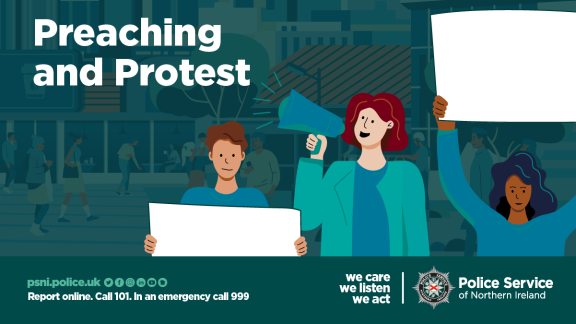
Freedom of thought, conscience and religion and freedom of expression are fundamental human rights enshrined in law. The right to preach and proselytise in public is not an absolute right and can be limited by, for example, the need to uphold the rights of others, protect public health and safety and by the need to prevent and detect crime. There is also a need to minimise disruption to normal life.
The freedom to express, debate, challenge and even ridicule opposing viewpoints is crucial to any democratic society and just because a remark is perceived as offensive or insulting by someone else does not mean that it constitutes “hate speech”. However, this freedom does not protect statements, actions or written material that discriminate against or harass, or incite hatred or violence against, other persons and groups, particularly by reference to their race, religious belief, gender identity or sexual orientation.
The role of the police is to facilitate any lawful exercise of freedom of expression while ensuring the rights of all persons are protected. In line with our oath of attestation under Section 38 of the Police (Northern Ireland) Act 2000 and Code of Ethics Police Officers will discharge their duties with fairness, integrity, diligence and impartiality, upholding fundamental human rights and according equal respect to all individuals and their traditions and beliefs.
When preaching, proselytising or protesting what should you do?
• If requested, we would ask that you engage with the police who are there in part to ensure your safety and facilitate the lawful exercise of your freedom of expression.
• You must not endanger the safety of yourself or anybody else.
• You should not block the roadway or footpath.
• You should respect the rights of others.
If you are protesting against a public procession:
• You must notify the Parades Commission. This notification must be given not less than 14 days before the date on which the parade is to be held. More details and online notification can be found at www.paradescommission.org
• If requested, we would ask that you engage with the police
• You must comply with your obligations under the Public Processions (NI) Act 1998 and the Parades Commission code of conduct.
• You should follow instructions provided by police.
What will police do?
Our approach to everyone will exemplify ‘Policing with the Community’. Section 31A of the Police (Northern Ireland) Act 2000 sets out the statutory basis for this approach stating Police Officers shall carry out their functions with the aim of securing the support of communities and acting in co-operation with communities.
• If appropriate, we will attend to ensure that the rights of all concerned are upheld.
• We may identify any issues of concern e.g. potential criminal offences or unacceptable impact on the rights of others.
• We may issue advice, warnings or lawful instructions to those involved to ensure any preaching, proselytising or protest remains lawful.
• If any offences take place we will take lawful and proportionate action in response.
If an offence is suspected by police:
• We may record evidence e.g. by way of handheld, body worn or vehicle mounted-cameras.
• Where possible, we may warn persons suspected of committing an offence.
• If necessary and proportionate we may arrest and detain persons suspected of committing an offence.
• Ultimately the decision on whether to prosecute will rest with the Public Prosecution Service.
